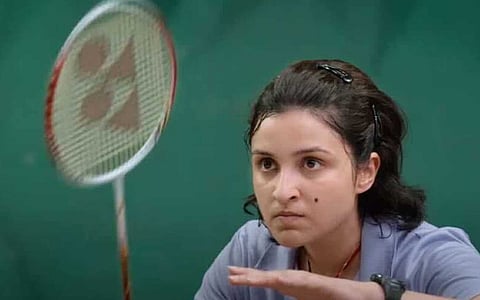
- In-Depth Stories
- Web Stories
- Reviews
- News
- FC Lists
- Interviews
- Features
- FC SpecialsFC Specials

Director: Amole Gupte
Writers: Amole Gupte, Amitosh Nagpal
Editor: Deepa Bhatia
Cinematography: Piyush Shah
Cast: Parineeti Chopra, Meghna Malik, Manav Kaul, Eeshan Naqvi, Subhrajyoti Barat
The Bollywood sports movie has become a veritable cottage industry. Every year, we get a handful of films that follow a standard template – the discovery of innate talent, the family making sacrifices, a sweaty training montage, the dark night of the soul when the athlete loses his or her way, a loss so humiliating that all seems lost and then, the triumphant victory. All of this is laced with an inspirational anthem – Chak De! India remains the gold standard – and a running commentary on social issues. Inevitably, sports, and the journey of the athlete, morph into an invigorating cry of nationalism. The tricolour flies high. Think Mary Kom, Bhaag Milkha Bhaag, M.S. Dhoni: The Untold Story, Dangal, Soorma, Panga, Gold, Saand ki Aankh. The list goes on.
Saina doesn't deviate from the formula. The film is based on one of our greats – badminton champion Saina Nehwal, who has been a world number 1 player and won over 24 individual titles, including an Olympic bronze medal. This is a star athlete who put Indian badminton on the global map and made the sport aspirational. Her story is one of striving, failure and blazing success.
Writer-director Amole Gupte hits each of the usual sports film beats but also bungs in woman empowerment. The film begins with a voiceover in which Saina describes herself as 'Bharat ki beti'. We see a shuttlecock and racquet before her face comes into focus – within seconds, we know that this will not be a film with subtlety or nuance. Saina's story will play out in broad strokes.
Amole starts the narrative with Saina's 2018 win at the Commonwealth games. How she got here is told in flashbacks, starting with her mother Usha playing a game of badminton while she's pregnant with Saina. Much of Saina's fire and grit is credited to Usha who resolved that her daughter would be a champion. Usha's iron hand reminded me of Mahavir Singh Phogat in Dangal. When Saina gives her a silver medal, Usha rewards her daughter with a resounding slap in public. Later at home, she berates Saina for losing the gold while the child looks on sullenly. There is an older daughter hovering in the background who seems to be completely ignored. Even when Usha sings a lullaby, it's with Saina's head in her lap. What does this level of pressure do to a child? Was there tension between the sisters? Or the parents as the mother propelled her daughter to world domination? Did Saina, who woke up at 3 am every day to be at training at 5, ever want a day off?
The film doesn't venture into these prickly areas. Instead, Amole chooses to focus on tidy highs and lows. The first half, devoted to Saina's ascent, features training montages and matches in succession. The voiceover explains Saina's thinking through a game and how she outsmarts her opponent but we have little sense of her as a human being off the court. The scenes become repetitive and the pacing, sluggish. Thankfully, the drama picks up in the second half when Saina's career falters and she goes up against her coach and mentor Rajan, modeled on Pullela Gopichand. This relationship throws up conflict and emotion. And Manav Kaul does a fine job as the clinical coach who is hellbent on having his protégés succeed.
Saina alternates between exciting match sequences and dull stretches that seem tacked together like a highlights reel of the athlete's life. One of the problems is that the other characters aren't written sharply enough. Meghna Malik as the mother is bewilderingly loud but at least she infuses energy into the narrative. Saina's love interest, Kashyap, modeled on her husband Parupalli Kashyap, doesn't become more than a cheerleader. Her father who belongs to the pantheon of loving, daughter-supporting dads like Pankaj Tripathi in Gunjan Saxena: The Kargil Girl, also does little apart from cheering in front of the television screen, and in one scene, peeling potatoes so they can have parathas.
The weight of this film of course rests on the shoulders of Parineeti Chopra. Like the film, she is inconsistent. In some scenes, the body language and inherent toughness seem performative. In others, her eyes find the fire and anguish of Saina's journey. I don't know enough about badminton to comment on her technique but editor Deepa Bhatia cleverly splices through the match sequences so that on court, Parineeti doesn't look like an imposter. The music by Amaal Malik and lyrics by Manoj Muntashir and Kunaal Vermaa, especially the rousing Parinda, stand out.
Saina begins with a disclaimer that it is a fictionalised and dramatised version but the end credits roll against photos of the real Saina and Parineeti in the same poses, doing the same actions and even wearing the same clothes. Which encapsulates the problem with too many biopics. Eventually, authenticity isn't as important as capturing the essence of a person and evoking emotion. Saina, shining with sincerity and hard work, also misses this crucial point.
You can watch the film at a theatre near you. Don't forget to wear a mask.